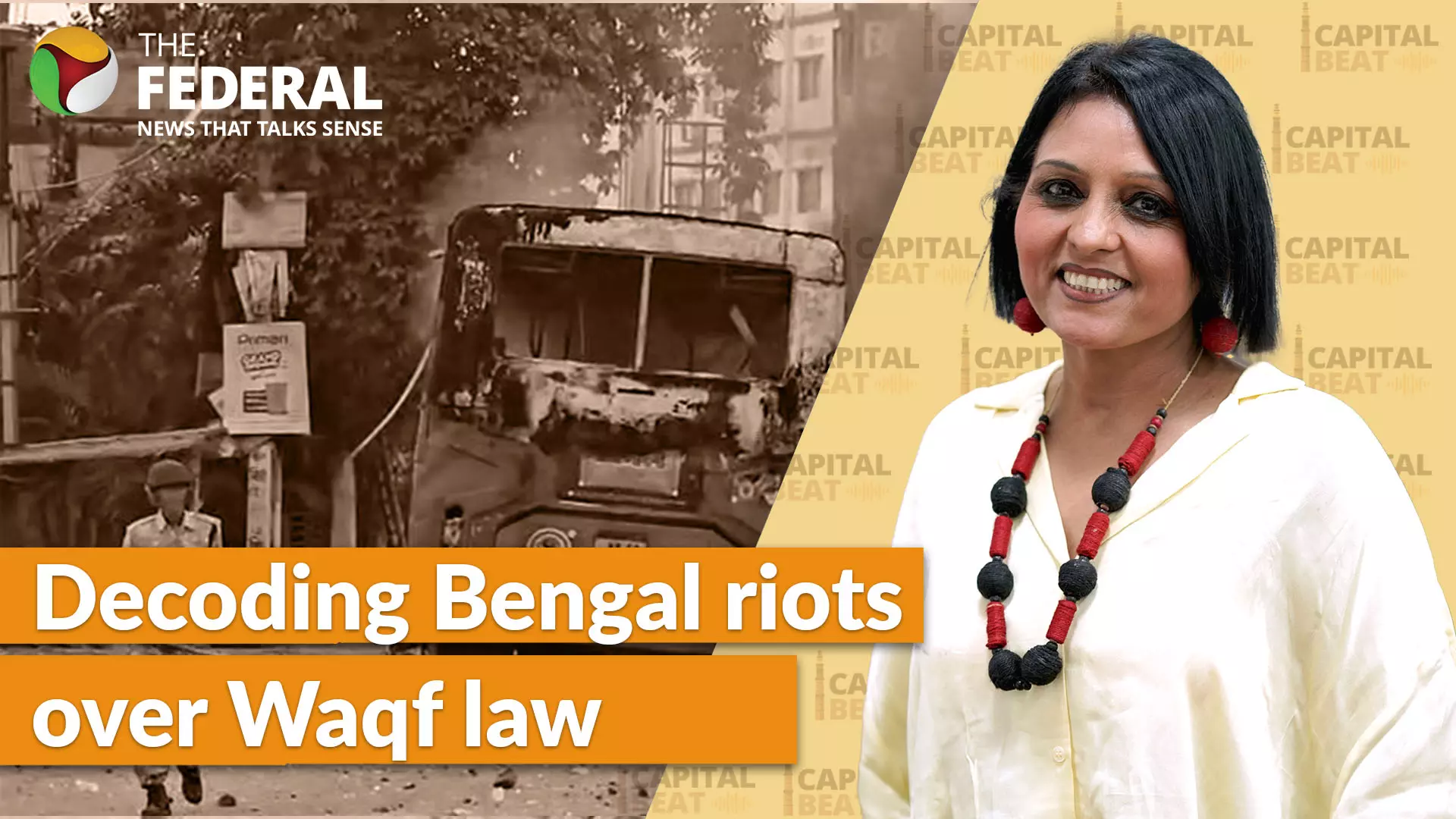
Waqf Act violence in Bengal: Who gains from the chaos?
Murshidabad erupts over Waqf Act protests, with political parties trading blame and courts stepping in; who really benefits from this unrest?

West Bengal’s Murshidabad district has turned into a political and communal flashpoint following violent protests against the recently enacted Waqf Amendment Act.
With three reported deaths, over 150 arrests, and the deployment of central forces ordered by the Calcutta High Court, questions are being raised not just about law and order, but also about the political motives behind the chaos.
The Federal's Capital Beat panel discussion hosted by Neelu Vyas brought together legal experts, academics, and political voices to dissect the volatile situation.
What sparked the violence?
The unrest began on April 8 and escalated rapidly, resulting in deadly violence and widespread disruption. Arindam Das, a lawyer and Murshidabad native, emphasized that confusion over the new Waqf Act among the public played a critical role.
“If you ask people what the Act changes, most won’t be able to answer,” he said. He blamed both state and central governments for failing to educate the masses and stressed that the issue is now legally pending before the Supreme Court.
“Blocking highways or rail tracks won’t change the law,” he added, urging the government to involve legal experts and community leaders in spreading awareness.
Also read: Murshidabad riots: BJP flooding Net with fake photos, videos, says TMC
Political gamesmanship?
The discussion quickly turned to the political dimensions of the unrest. Das questioned whether both the BJP and the Trinamool Congress (TMC) were using the crisis to score political points. “Once you're in government, you can't differentiate between state and central duties,” he stated, accusing both sides of exploiting the unrest rather than resolving it.
Political analyst and professor Prasenjit Biswas suggested that the inclusion of non-Muslims in the Waqf boards and dismantling of Waqf tribunals had justifiably angered the Muslim community. “It takes away exclusive rights over endowed properties,” he said.
He accused the BJP of pushing an anti-Muslim narrative and provoking emotional outrage, leading to street protests. Biswas also criticized the deployment of BSF forces, saying it undermines the state’s authority and turns local issues into national security concerns.
Also read: Murshidabad riots: Hundreds flee, take shelter in Malda
Polarizing for votes?
Ketan Jaiswal of the West Bengal Pradesh Congress argued that both BJP and TMC are engaging in divisive politics ahead of elections. “In 2021, communal polarization helped both parties; TMC increased its Vidhan Sabha seats and BJP rose from 3 to 73 seats,” he pointed out.
Jaiswal also called out the TMC for inaction during the Parliament vote on the Waqf (Amendment) Bill and during the CAA debate, accusing them of double standards for electoral gain. “The common people suffer while political parties benefit,” he said.
Failure of governance?
There was unanimous concern about the failure of the state police and administration. Both Jaiswal and Das emphasized that local authorities remained mute spectators in the early stages of the unrest.
Das revealed that the state did not oppose the deployment of central forces but only requested control over their usage. “Both Hindus and Muslims have been victims in this violence,” he clarified, warning against any narrative that paints one community as the sole target.
Also read: Murshidabad riots: Arrests go up to 150, BJP MP seeks AFSPA in Bengal
Rajiv Srivastava warned that the situation is more dangerous than it appears. “This is not just a local problem. It’s a national issue with international implications,” he said, linking the unrest to broader concerns about border security, smuggling, and communal propaganda.
He accused politicians of creating a "concocted narrative" for polarization and claimed that hate speech and provocative statements have been left unchecked by authorities.
As the Supreme Court is set to hear multiple petitions challenging the Waqf Act after April 16, panellists expressed cautious optimism about the return of normalcy.
Biswas noted that efforts were underway to build bridges between communities and that the situation was improving. Jaiswal, however, remained sceptical, stating that either the government had failed or intentionally let the violence unfold for political advantage. “The public has lost faith in the state police,” he said, blaming both TMC and BJP for manipulating communal sentiments.
The Capital Beat discussion painted a grim picture of political opportunism, administrative failure, and communal disharmony in West Bengal. While the violence in Murshidabad is rooted in the legal intricacies of the Waqf Act, it has spiralled into a larger political and social crisis. With central forces on the ground and legal scrutiny on the horizon, only time will tell whether peace can be restored—or whether this chaos is a preview of the electoral battles ahead.
Also read: Outrage against Yusuf Pathan for 'good chai' post in aftermath of Bengal violence
The content above has been generated using a fine-tuned AI model. To ensure accuracy, quality, and editorial integrity, we employ a Human-In-The-Loop (HITL) process. While AI assists in creating the initial draft, our experienced editorial team carefully reviews, edits, and refines the content before publication. At The Federal, we combine the efficiency of AI with the expertise of human editors to deliver reliable and insightful journalism. The content above has been generated using a fine-tuned AI model. To ensure accuracy, quality, and editorial integrity, we employ a Human-In-The-Loop (HITL) process. While AI assists in creating the initial draft, our experienced editorial team carefully reviews, edits, and refines the content before publication. At The Federal, we combine the efficiency of AI with the expertise of human editors to deliver reliable and insightful journalism.

